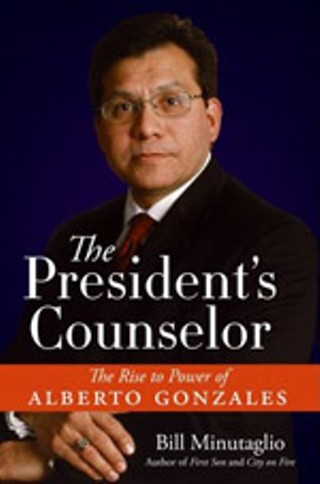Book Review: Readings
Bill Minutaglio
Reviewed by Michael Yang, Fri., July 21, 2006

The President's Counselor: The Rise to Power of Alberto Gonzales
by Bill Minutaglio
Rayo, 368pp., $24.95
Despite Bill Minutaglio's admirable approach, many interviews, and access to a wide range of documents, Alberto Gonzales rarely comes into focus in his first biography. Gonzales' story is almost a cliché of the American Dream, his being a Horatio Alger emergence from the poverty of a migrant worker's son's upbringing to the office of attorney general. But, of course, it's all more complicated than that. More than his background or his positions in politics and law, he is probably most known for the torture memos, documents denying the applicability of the Geneva Convention with respects to al Qaeda and the Taliban, documents used, many believe, to pre-emptively justify atrocities such as Guantánamo Bay. The President's Counselor attempts to uncover the inner thoughts and motivations of Gonzales, who Minutaglio claims has the ear of the president.It's a difficult task, especially since Gonzales is most often described as secretive. And, in the end, this trait provides one of the most problematic and fascinating aspects of the book. Amid the first chapters, no one – classmates, teachers, or friends – seems to have a single, specific story to tell about him. Instead, we're left with vague, strikingly similar assessments from his acquaintances: He was reserved, competitive, analytical. No one knows him well, and it's hard not to sympathize watching Minutaglio try to define this apparent cipher. In the first third of the book, Gonzales appears as only a peripheral figure in his own story. We get side stories about Gonzales' hometown of Humble, his father, Houston, Fort Yukon, and Rice University. But around the time he attends Harvard Law, his secrecy begins to feel increasingly extreme. At Rice, his friends don't know about his marriage. Later, his friends and colleagues are not cognizant of various dramatic events in his life, including his divorce, his ex-wife's death, and the death of his brother. Surely, this isn't typical behavior, and, in the end, it appears indicative not only of Gonzales' character, but of what made him attractive to Bush in the first place.
As Gonzales assumes increasingly prestigious positions – first in Bush's governorship and then in his presidency – the analysis of his past begins to be replaced by an exploration of larger, more political events that Minutaglio succinctly and effectively explains; although, in some cases, sentences and authorial asides are repeated unnecessarily. In discussing the controversial and morally ambiguous death penalty and torture memos, the book tries to place Gonzales' actions in context of his character, but this is not a "fall from grace" story, since we don't see any evidence of an earlier idealism to be corrupted. It's also not really a "rise to power" story because it's just not clear what power Gonzales has ever had in shaping policy. In fact, despite Minutaglio's assertion that "Bush was almost always predisposed to follow what Gonzales recommended," the evidence within the text suggests it's more likely that Gonzales does what Bush tells him and that his usefulness is not to make decisions but to justify decisions already made. Therefore, while it's an understandable tactic to overstate Gonzales' importance, it's not wholly convincing. Even during his most significant actions under Bush, it's not difficult to assume that if Gonzales had not played his part in these events, someone would have been found who would.
In fact, one of the successes of this biography is that it provides a clear study of how cronyism works in the White House. As Minutaglio writes about Gonzales, "There were always better legal minds around him – even he knew it." More than anything else, he embodies the attributes cherished by this president – secrecy, loyalty, and obedience – and, by examining his career, Minutaglio affords us a view into how the administration's policies have been defined by acceptance rather than dissent. Only once or twice in the biography do we see Gonzales make political decisions independent of Bush, and only in these instances do we gain a brief glimpse into his beliefs. But these moments are rare, and, if this book is any indication, Gonzales' political future will not be marked by independence or fervent moral stands, but by blind adherence to the brokering of the powers that be.









